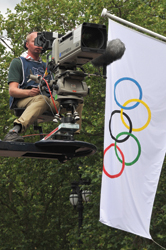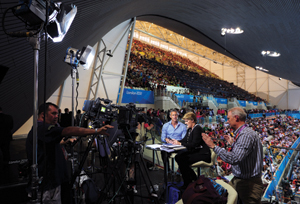 |
With the 2012 Games in full swing, the IOC has already secured $3.7 billion for the 2014 and 2016 Games globally.
Photo by: GETTY IMAGES
|
For years, the International Olympic Committee filled its coffers with U.S. broadcast money, but a new sales strategy is bringing global balance to its revenue haul.
For the first time, Olympic TV rights revenue from the U.S. will fall below 50 percent of total IOC television money during the next quadrennium, said Timo Lumme, the IOC’s managing director of TV and marketing services.
The move comes four years after the IOC overhauled its media sales strategy by ending a decades-old practice of selling TV rights to broadcasting unions, which traditionally covered large regions of continents. Instead, it has sold rights on a country-by-country basis — a move that Lumme said has allowed it to drive significant revenue increases in markets around the world.
The IOC already has secured $3.7 billion for the 2014 and 2016 Games globally, $2 billion of which will come from NBC’s deal signed last summer. The IOC last week announced a deal with CBC in Canada, and it expects to pass the $4 billion mark after it closes additional deals in Latin America and other markets, bringing NBC’s contribution below 50 percent for the first time.
By comparison, NBC’s $2 billion rights fee accounted for more than 51 percent of the IOC’s $4 billion in TV revenue for the 2010 and 2012 Games.
In 2009, Brazilian broadcasters reportedly paid $8 million to $9 million for Olympic TV rights as part of a Latin American broadcasting union known as OTI. The IOC broke Brazil out of the union two years ago, before Rio was awarded the 2016 Games, and sold the rights for the 2014 and 2016 Olympics to three media companies in a deal worth an estimated $170 million, representing a roughly twentyfold increase from its individual deal with OTI.
 |
The BBC broadcasts from inside the Aquatics Centre on July 28. Broadcasters from outside the U.S. are providing a growing portion of the total media rights fees paid to the IOC.
Photo by: GETTY IMAGES
|
The success in Brazil came on the heels of a similar sales strategy in China. The IOC in 2008 broke China out of the Asia-Pacific Broadcasting Union, which paid $17.5 million for the rights to the 2006 and 2008 Games across the continent, and sold the rights to CCTV for the 2010 and 2012 Olympics for a sizable $100 million. On top of that, it recently closed a $160 million deal for the 2014 and 2016 Games with the state-owned broadcaster.
“Other markets are now starting to grow,” Lumme said. “The U.S. can’t grow because it contributed for this quad in effect a 50 percent increase [from 2005 to 2008]. Knowing the U.S. is flat, the increase will be contributed by other territories.”
And the IOC is not done.
Lumme says the organization may close another deal before the London Games end. And with the 2016 Games in Rio being billed as the first Latin American Olympics, Lumme is particularly optimistic that the organization will be able to increase TV rights revenue in Latin America, where it still has rights to sell in Mexico. It historically has sold pan-regional rights there to OTI and ESPN, but it may look to sell individual rights in Peru, Chile and other markets in hopes of increasing revenue.
“We have a real opportunity to move the meter in terms of valuations [in Latin America] with the Rio Games,” Lumme said. “I believe we will have a very competitive landscape. I’m excited.”
The IOC also has to sell rights in Asia for the 2014 and 2016 Games. Overall, it does not expect to generate the 50 percent increase in rights fees it got between the 2005-2008 quad and the 2009-2012 quad, but it does expect to pull in more than the $3.9 billion it got from 2009 to 2012.





